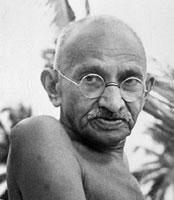| Connecting
over 25 millions NRIs worldwide |
|
|||||||||||||||||||||||
|
||
Hamilton Celebrates Gandhi Festival Toronto, Oct 09, 2009 The City of Hamilton celebrated Mahatma Gandhi’s 140th birthday on October 3, 2009. It is a tradition in that has been carried on for 17 years thanks to the efforts a McMaster University Professor, Dr. Rama Singh and many of his friends and associates. This festival also marks the International Day of Non-Violence (October 2) and is sponsored by McMaster University Centre for Peace Studies, India-Canada Society and the City of Hamilton. The purpose of the festival is to keep the main message of Gandhi alive to promote harmony and peace in the community and to resolve problems through dialogue. The theme of this year’s festival was “Swadeshi”, the Economics of Self-Reliance. In his struggle to gain Independence of India from the British Colonials, Gandhi had advanced the idea Swadeshi and boycott foreign made goods, which was creating poverty in India and depriving people of meaningful jobs. Nearly 350 people gathered at McMaster University Downtown campus in Hamilton, joined by the chief guest of the event, Dr. Rajmohan Gandhi, who is historian, biographer and a grandson of Mahatma Gandhi. He talked about the Gandhi’s prin¬ciple of "Swadeshi". An example in Hamilton would be campaigns to encourage buying lo¬cal food rather than depending on imported supplies from the south. He also said people who are seri¬ous about peace must play a role in eradicating suspicion and preju¬dice between Muslim and non-Muslim worlds. He said current tension in the world, in some ways, is more troubling than ani¬mosities during the Cold War. The fight then was between govern¬ments, whereas today anxieties are between people. He said, "Many in the so-called Muslim world feel the western world is against them. They think some¬thing is wrong with the western world. In many parts of the western world there is a deep feeling against Muslims as a people ... not just about the governments, but about the people of those countries. People who are serious about peace must play a role in building bridges between both sides”. One positive local example of bringing sides together is an ambitious and successful "peace project" at the Six Nations Re¬serve. Teacher Suzie Miller, from Emily C. General Elementary School in Ohsweken, told the crowd about a pen-pal program between pupils at her school and children attending other Caledonia-area schools. "Having kids write to each other helps them understand each other," she said. This reduces the mistrust that has been simmering in the Caledonia and Ohsweken communities near Hamilton for several years as a result of property disputes between Native and non-Native communities. Preeti Saran, consul general of In¬dia also spoke at the Festival. She said, "Gandhi's message is more im¬portant today than ever before as nations across the world continue to grapple with the threat of con¬flict, violence and terrorism" and added "As long as there is a temptation to resort to violence in the human mind, Mahatma Gandhi's message of nonviolence will tug at our hearts!' The Gandhi Peace Festival also featured music, children’s dances, multi-faith prayer and peace walk around the downtown core. The festival ended with free vegetarian lunch provided by a local Indian restaurant. In addition to the Festival, there was the 12th Annual Mahatma Gandhi Lecture at McMaster University presented by Professor Rajmohan Gandhi, which centered on the personality of Gandhi and his childhood memories of his grandfather Mahatma Gandhi. He emphasized that had a complex character and created many effective strategies to counter the British schemes of domination. He had developed the strategy of “Satyagrah”, the power of Truth and Non-cooperation. He led the famous Salt March in 1930 to produce Sea Salt, which was banned by the British to collect high taxes through their monopoly. He walked 400 km through villages spreading the message of non-cooperation and non-violence and gathering support of thousands of people in the process. The Centre for Peace Studies maintains a website for Gandhi Festival, which has information on Gandhi and the publications of Gandhi Peace Festival for this year and previous years. cc Dr. Rama S. Singh, Professor, McMaster University
|
||
| |
|
|

